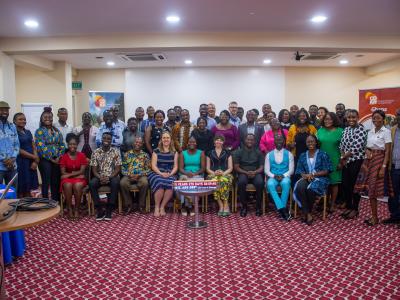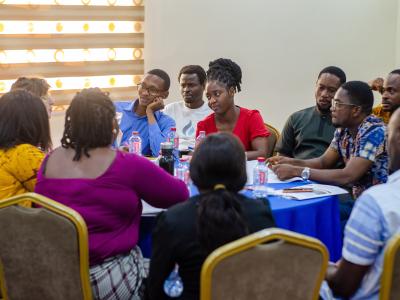Empowering climate action: Insights from the CDKN programme in Ghana
Empowering climate action: Insights from the CDKN programme in Ghana
The third phase of the Climate and Development Knowledge Network (CDKN) programme was launched in Ghana in October, marking a significant step in implementing innovative climate action in line with existing climate-related national policies, strategies and plans. Some of these include the National Adaptation Plan, the Updated Nationally Determined Contributions (NDCs) and the National Youth Climate Action Plan (NYCAP).
The event convened over 40 institutional stakeholders from various sectors, including youth-focused organisations, academia, civil society, government agencies and advocacy groups, as pictured below. The launch introduced the programme and the country's activities, fostered networking among institutional stakeholders, and established collaborative partnerships for ground-level climate action.

Reflecting on CDKN’s previous work in Ghana
Prof. Chris Gordon, the advisor to the Ghana CDKN programme, discussed the foundations laid during the first phases of implementing CDKN; shedding light on how this informed the development of Ghana’s National Climate Change Policy and action lab, which fostered climate-compatible development, and critical thinking and research for climate action in Ghana. The successes and challenges of implementing the second phase of the CDKN programme were highlighted by Millicent Kwawu, which included extensive stakeholder engagement across various sectors, even amidst the Covid-19 pandemic. The second phase emphasised key themes such as water, energy, food, gender inclusivity, and the integration of local knowledge in decision-making.
CDKN builds on previous activities
The design of the CDKN Ghana programme builds on the recommendations from the two previous phases while also leveraging cross-collaboration and cross-sectoral partnerships. Dr. Prince Ansah, the Country Engagement Lead, outlined CDKN's goals in Ghana around community climate action, youth empowerment, strengthening climate literacy and enhancing innovative nature-based solutions. The programme aims to build resilience in vulnerable communities through strategic partnerships, user-friendly materials and collaborative networks.
Key outcomes and insights from stakeholder engagement
Inclusive climate action
The need for a diverse group of stakeholders with different capacities is relevant for inclusive and comprehensive climate action. The provision of platforms such as workshops, seminars and conferences enables stakeholders to share their experiences, insights, and strategies, highlighting the importance of multi-sectoral collaboration and learning.
Youth empowerment and community engagement
A significant theme for the CDKN programme in Ghana is enhancing the capacities of young people and local communities for climate action. The stakeholder discussions underscored the necessity of involving young people in sustainable initiatives and leveraging their energy and innovation for climate resilience at national and local levels.
Integration of local knowledge and practices
The crucial role of incorporating local knowledge and practices into climate action plans was echoed by several institutions working with communities. This approach not only ensures the relevance and effectiveness of strategies but also promotes community ownership and participation in implementation.
Ecosystem-based adaptation strategies
Panel discussions delved into ecosystem-based adaptation (EbA) approaches, particularly in addressing flood risks in Ghana's coastal areas. Experts emphasised the significance of restoring natural ecosystems and integrating EbA into national adaptation plans. An example was raised by some panel members on how protected wetland could be vital for flood risk management along coastal areas of Ghana.
Strengthening research and data gathering
The need for more rigorous research and data collection in Ghana was a key point of discussion. This focus aims to enhance the country’s contribution to global climate discourse and ensure that policies and actions are informed by reliable evidence. For instance, there was a demand from several advocacy groups at the event to partner with academic institutions like the Center for climate Change and Sustainability studies (C3SS) to provide short courses or webinars on the local evidence of climate change and solutions.
Innovative approaches to climate literacy
There was much interest from institutions on how the CDKN programme intends to leverage creative strategies to promote climate literacy, such as using music, virtual reality, art exhibitions and poetry. This approach aims to engage a broader audience, particularly young people, in understanding and addressing climatic risks.
Challenges and opportunities for policy advocacy
The event provided insights into the challenges faced in lobbying for stronger climate policies, including limited resources and access to expertise. It also identified opportunities for addressing these challenges through resource mobilisation and collaboration with research institutions. A representative from the Youth Climate Council Ghana (YCC) expressed his dissatisfaction with accessing resources for young people to pursue their initiatives.
Future directions and collaborative networks
The discussions at the event culminated in identifying future directions for the CDKN programme. These include developing strategic partnerships, mentorship programmes, creating user-friendly climate materials, such as storytelling and art competitions, and building community resilience led by young people. The event emphasised the need for a collaborative network to achieve these goals. An example of such collaborative partnerships is CDKN’s work with Green Africa Youth Organisation (GAYO) and Environment 360 Ghana on an incubation programme that seeks to harness nature-based solutions for tackling climate risks like flooding in cities.

The CDKN Ghana programme will contribute to relevant policy implementation plans at the national and local levels. By bringing together a wide range of stakeholders, the CDKN programme underscores the importance of collaborative, inclusive, and locally-relevant approaches to climate change adaptation and mitigation. As implementation progresses, the insights and outcomes will be crucial in shaping effective and sustainable climate action in Ghana and potential learning for other countries in the region.
Catch up with us via our website www.cdknghana.org and across all social media platforms - LinkedIn, Facebook Instagram, YouTube , TikTok
